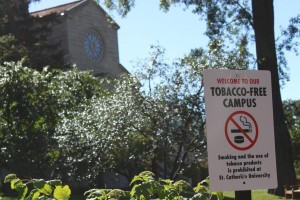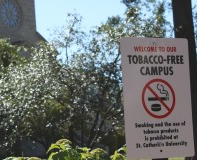Undergraduate Student Government members are busy during the last week of the semester as they continue working on three initiatives proposed earlier this semester.
The initiatives include a smoking ban on campus, improving neighbor relations, and improving transfer student experiences. Greg Scharine, USG vice president of financial affairs, said all initiatives have made significant progress this semester, but the smoking ban initiative has gotten further than the other two.
Researching a smoke-free campus initiative
Sophomore Class President Mike Orth has worked particularly on the smoking ban initiative. USG sent out a 10-question survey Tuesday, Nov. 30, asking students their thoughts on a campus-wide smoking ban.

Despite only having 10 questions, the survey questions are broad, Orth said.
“We want to take a look at the results and take the initiative in a direction students want to go,” Orth said. “We really want to be a student government that listens to the students.”
The survey ends Tuesday, Dec. 7. USG will analyze the results and present the findings to the administration Monday, Dec. 13.
In addition to the survey, USG launched a smoke-free committee at the beginning of November to spread awareness of the issue, and the committee will continue to meet next semester, Orth said.
USG is still researching what a smoke-free campus would be like and what other institutions have done to make smoke-free campuses successful.
Scharine said USG will have to view the results very carefully to see if a smoke-free campus is right for the students.
“If we go smoke-free,” Scharine said, “we have to go smoke-free on all four campuses.”
While the survey will provide student input, USG still needs faculty and staff opinion to make the idea possible.
Improving neighborhood relations
Neighbor relations is another ongoing initiative.
USG started neighborhood dinners this semester where off-campus students, faculty and community members get together to discuss what St. Thomas could do to aid the community more, Neighborhood Senator Linnea Bicking said.
The dinner is hosted by a different neighbor each meeting, and USG tries to find a neighbor who has strong views on current issues, Bicking said.
The last dinner took place Thursday, Dec. 2. Scharine told USG members at the council meeting Sunday, Dec. 5 that the neighbors and students talked about winter concerns, progress on the West Summit Neighborhood Advisory Committee’s student housing buy-back program, and concerns about party houses.
Bicking said suggestions to work with landlords to make contracts stricter were also discussed.
Scharine said there was some talk about expanding community service into the neighborhood, so students who get called to the dean’s office can do work to help neighbors.
“Neighbors had bad stories about St. Thomas students, but they’re really willing to make changes,” Scharine said.
In addition to the dinners, Bicking said USG is trying to brainstorm other ideas.
Transfer student initiative is in beginning phase
Schraine said the transfer student relations initiative is still in the information-seeking stage. USG saw that many St. Thomas transfer students have trouble learning how to use university programs such as Blackboard and Murphy Online, he said.
Scharine said USG should focus its attention first on transfer student orientation. He said there’s disconnect between freshman-enrolled students and transfer students, which doesn’t help assimilate the transfers into St. Thomas. Once more information is gathered on transfer students, USG hopes to finalize a plan to help make orientation better and discuss it with the Dean of Students, Scharine said.
“The administration seems to be very happy with these initiatives,” Orth said.
All three initiatives will be continued next semester, but students will most likely see more information on the smoking ban, Orth said.
Theresa Malloy contributed to this report.
Nathan Spencer can be reached at spen9079@stthomas.edu.


I found the questions in the survey incredibly leading. I feel that a survey created by someone spearheading the Smoke-Free initiative would be difficult to keep even-handed. Also, preemptively creating a “Smoke-Free Committee” makes it difficult to believe that they’re taking the dissenting voice seriously – already researching methods they’ll need to implement and spreading awareness from within our Student Government.